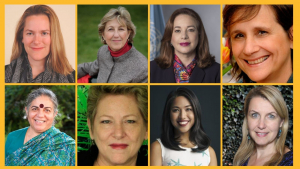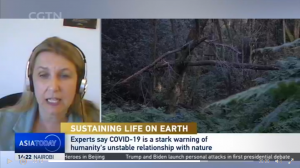
Press release
UN Biodiversity Summit: World Future Council calls for immediate action to mainstream biodiversity in all recovery plans and strategies for the COVID-19 pandemic.
Hamburg, New York, Delhi, Manila, Rio de Janeiro – 29 September 2020: As governments convene for the UN Biodiversity Summit on 30 September 2020 in New York, the World Future Council calls for immediate action to protect and conserve biodiversity. Mainstreaming biodiversity in all COVID-19 recovery strategies are vital to safe all life on earth, including the survival and well-being of humankind. In the interest of current and future generations, we need to prevent future pandemics, to ensure life supporting systems and live in harmony with nature.
One million animal and plant species are at the brink of extinction – the highest number in human history, according to the 2019 landmark Global Assessment Report by the Intergovernmental Platform on Biodiversity and Ecosystem Services (IPBES).
Members of the World Future Council recommend actions to be integrated in recovery plans for the Covid 19 pandemic, the 2020/2021 meetings of the UN, the UN Biodiversity Summit (CBD COP 15) where a new post-2020 Global Biodiversity Framework will be adopted, and the World Food Systems Summit.

The recommendations and comments of the WFC Members are as follows:
“There are key synergies to be gained between environment and well-being in designing post-pandemic economic stimulus, where law and governance mechanisms can provide a comprehensive approach to mainstream biodiversity into laws governing all economic sectors and to support nature-based solutions. Inclusiveness and equality are important dimensions for building a sustainable and resilient economy,” says Prof. Marie-Claire Cordonier Segger, Senior Director, Centre for International Sustainable Development Law (CISDL) and Councillor, World Future Council.
“Support to the new Global Biodiversity Framework must be ambitious on the part of governments and all parts of society. The understanding of the essential life support provided by nature needs to be mainstreamed in order to become a key part of decision making and factored into policies across all sectors” says Julia Marton-Lefèvre, Member of the Bureau of IPBES and Councillor, World Future Council.
“Governments should ensure a human-rights-based approach including by guaranteeing the rights of indigenous peoples as custodians of biodiversity, the right to a healthy environment, as well as the rights of Mother Earth to exist and flourish. An Earth System Approach is urgently needed to address the current extinction crisis” says Maria Fernanda Espinosa, President of the 73rd session of the UN General Assembly and Councillor, World Future Council.
“The Amazon is an expression of the abundance of life, its biodiversity is of incredible intrinsic value for today’s and future generations. Every child on this planet must be aware of it, every person that inhabits the planet should become a steward of the Amazon. Acts of destruction of the forest and its beings should be considered crimes against humanity “says Thais Corral, Co-Chair of the Sustainable Ecosystems and Livelihood Commission of the World Future Council and Founder, SINAL do Vale, Brazil.
„Biodiversity is the basis of life. Biodiversity is health – from the soil, to plants, to animals, to our gut microbiome. Governments need to ensure agro-ecology, small-scale family farming and local small-scale initiatives ensuring agricultural biodiversity within peasant seeds and livestock breeds“ comments Dr Vandana Shiva, Founding Councillor, World Future Council and Laureate of the Alternative Nobel Prize, India.
“An astounding 80 % of biodiversity is found in forests around the world. They are homes for humans, mammals, insects, and other critters. You have probably heard of the benefits of forests since you were a child. But now we are hearing of some of the serious threats which happen as result of unsustainable clearing of these same forests. Pandemics are just one such result. The United Nations Summit on Biodiversity will work to gain the commitment of all Member States to a global framework for biodiversity. Not just for the beauty. Not just for the clean air and water we derive from forests. But also, because our lives may depend on it in a future that may approach faster than we realize.” says Ms. Jan L McAlpine, Former Director, United Nations Forum on Forests (UNFF, 197 countries), CEO of McAlpine International Consultants and Councillor, World Future Council
„Governments need to tackle a major risk – zoonotic disease and future pandemics – in biodiversity policy for the next decade. We must eliminate practices that threaten the wellbeing of plants, animals and ecosystems and ban wildlife sales. They need to protect and restore ecosystems in order to ensure living organisms in the biosphere have the needed space without human interference“ warns Alexandra Wandel, Executive Director, World Future Council
„Biodiversity loss is one of the world’s most pressing issues, as it is linked to other development issues such as health and economics. Now, more than ever, we must take action to ensure that we conserve our natural resources for present and future generations and take ambitious actions to protect at least 30 % of the oceans by 2030“ comments Anna Oposa, Executive Director, Save Philippine Seas, and Councillor, World Future Council
MEDIA CONTACT
Anna-Lara Stehn
Media & Communications
World Future Council
anna-lara.stehn@worldfuturecouncil.org
T: +49 (0) 40 3070914-19
About the World Future Council
The World Future Council (WFC) works to pass on a healthy and sustainable planet with just and peaceful societies to our children and grandchildren. To achieve this, we focus on identifying, developing, highlighting, and spreading effective, future-just solutions for current challenges humanity is facing, and promote their implementation worldwide. The Council consists of 50 eminent global change-makers from governments, parliaments, civil societies, academia, the arts, and the business world. Jakob von Uexkull, the Founder of the Alternative Nobel Prize, launched the World Future Council in 2007. We are an independent, non-profit organisation under German law and finance our activities with institutional partnerships and donations.



